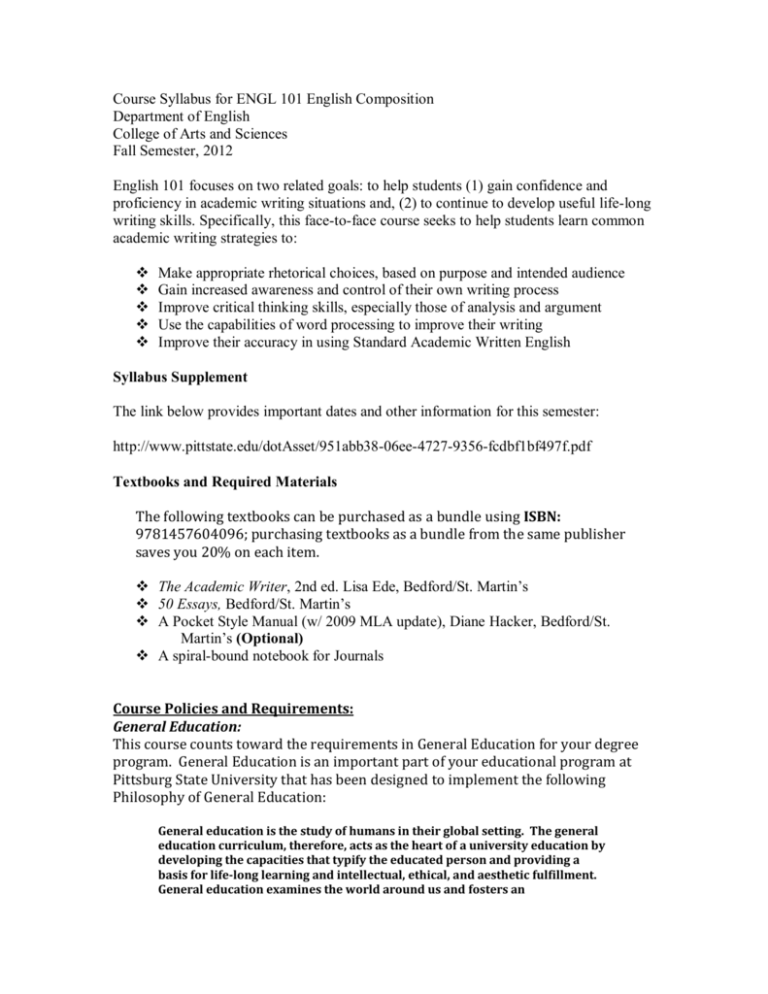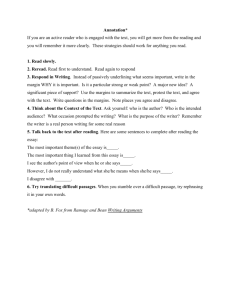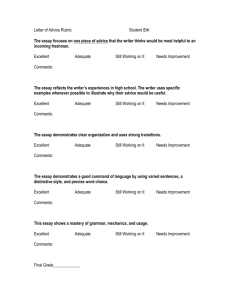Course Syllabus for ENGL 101 English Composition Department of
advertisement

Course Syllabus for ENGL 101 English Composition Department of English College of Arts and Sciences Fall Semester, 2012 English 101 focuses on two related goals: to help students (1) gain confidence and proficiency in academic writing situations and, (2) to continue to develop useful life-long writing skills. Specifically, this face-to-face course seeks to help students learn common academic writing strategies to: Make appropriate rhetorical choices, based on purpose and intended audience Gain increased awareness and control of their own writing process Improve critical thinking skills, especially those of analysis and argument Use the capabilities of word processing to improve their writing Improve their accuracy in using Standard Academic Written English Syllabus Supplement The link below provides important dates and other information for this semester: http://www.pittstate.edu/dotAsset/951abb38-06ee-4727-9356-fcdbf1bf497f.pdf Textbooks and Required Materials The following textbooks can be purchased as a bundle using ISBN: 9781457604096; purchasing textbooks as a bundle from the same publisher saves you 20% on each item. The Academic Writer, 2nd ed. Lisa Ede, Bedford/St. Martin’s 50 Essays, Bedford/St. Martin’s A Pocket Style Manual (w/ 2009 MLA update), Diane Hacker, Bedford/St. Martin’s (Optional) A spiral-bound notebook for Journals Course Policies and Requirements: General Education: This course counts toward the requirements in General Education for your degree program. General Education is an important part of your educational program at Pittsburg State University that has been designed to implement the following Philosophy of General Education: General education is the study of humans in their global setting. The general education curriculum, therefore, acts as the heart of a university education by developing the capacities that typify the educated person and providing a basis for life-long learning and intellectual, ethical, and aesthetic fulfillment. General education examines the world around us and fosters an understanding of our interactions with the world and our place in the universe. General education celebrates the creative capacities of humankind and helps to preserve and transmit to future generations the values, knowledge, wisdom, and sense of history that are our common heritage. Course Objectives: Upon successful completion of this course, you will be able to: 1. Write coherent, well-organized essays employing the appropriate conventions of written English. 2. Understand and demonstrate an awareness of basic rhetorical strategies through various forms of writing. 3. Understand the relationship between writer and audience. 4. Understand and demonstrate techniques of revision (not merely “copy editing”). 5. Demonstrate knowledge and awareness of the role of language in society. 6. Demonstrate knowledge of the functions of language in representing experience, in shaping feelings and ideas, and in communicating with and influencing others. 7. Understand the relationship between reading and writing. 8. Be able to access information through library resources and to incorporate that information in an organized and coherent manner in writing. 9. Demonstrate the basic computer skills of word processing, as expected of a computer literate person. Assessment Participation in the In-Class Assessment done at the beginning of the semester is a requirement for passing the course. To complete the in-class essay, students will be given several handouts of information to read before the day the assessment is given. Information in these handouts should serve as background information and evidence for your argument in the essay. Students may not write essays ahead of time. Assessment essays that have been composed outside of class will not be accepted. For Portfolio #1: Students who earn a 75 % or below on the assessment assignment are required to use the Writing Center for the major paper in Portfolio #1. That portfolio will not be accepted without documentation of a Writing Center visit (a stamp or note from a Writing Center employee). Portfolios that are returned ungraded because the student did not attend the Writing Center will be accepted according to the late paper policy after the student visits the Writing Center and provides documentation of that visit. For Portfolios #2, #3 and #4 Students who earn a 75% or below on the assessment assignment who do not use the Writing Center for each portfolio’s paper will lose 5% of each portfolio grade. Communication and Use of Canvas Course Policies and a copy of the Syllabus will be posted on Canvas. I will post many course documents on Canvas, so please make sure you are able to access the system. I will use Canvas Messaging for course communication, so please be sure to check your email often. I will notify you via Canvas if class and/or my office hours are cancelled for any reason. During inclement weather class will be in session unless the University is closed or you receive an email from me notifying you that class is canceled. Attendance Class attendance is a vital component of the English 101 experience. Students who miss more than 3 class periods will be dropped from the course. You are required to attend class regularly and on time. Students who enter class after roll is taken will be counted absent. Please notify me in advance when you must be absent for a family emergency, illness or other such unavoidable event. Grading By University policy, course grades in English 101 are: A (90-100%), B (80-89%), C (70-79%), or NC (No Credit). A NC grade is recorded on the student’s transcript but is not calculated into the student’s grade point average. Students who receive a grade of NC must repeat the class until they receive a grade of C or better. Writing Portfolios All of the required writing for this course will be submitted in one of four portfolios, each due at the end of a 3-5 week period. Grades are calculated on a point’s basis as follows: Portfolio 1: Narrative Writing 140 points Portfolio 3: Analytic Writing 220 points Portfolio 2: Explanatory Writing Portfolio 4: Peer Editing Research Writing Conferences Journals Rough Drafts Total: 220 points 270 points 80 points 20 points 50 points 85 points 1,075 points Portfolio assessment allows your instructor to see your writing in context because you include more than one piece of writing at a time. Each portfolio submission will include: a major paper and its required draft(s), other short writings that may include micro themes (short one-two page essays), warm-up journal writings/inclass writing, and a Postscript on the Writing Process. All portfolios must be completed on time and must contain all major required work in order to pass the course. There is no option in the Composition Program at PSU to not complete all required work. (See Late Work Policy). All papers will be submitted on Canvas. Late Work Policy All student work is expected to be handed in on time. Late portfolios will be accepted one class period late for a maximum of half credit. Any other late work will not be accepted. Students with extenuating circumstances must contact me for an extension before the due date. Plagiarism and Academic Dishonesty All written work in English 101 must be your own. If you plagiarize, in whole or in part, from any source (including the internet), or if you fail to document sources properly, you could receive a zero for the assignment, a No Credit for the course, be placed on academic probation, or be dismissed from Pittsburg State University. See full policy by clicking the link below: http://www.pittstate.edu/audiences/current-students/policies/rightsandresponsibilities/academic-misconduct.dot Extra Credit Extra Credit opportunities may be offered throughout the semester. Extra credit will be applied to the upcoming portfolio due. You may not improve your grade through extra credit work by more than one letter grade regardless of the amount of extra credit work you perform, nor can you apply extra credit earned to subsequent portfolios (eg: You cannot do extra credit work before Portfolio #1 and have it applied to Portfolio #2). I am not responsible for devising alternative possibilities for extra credit in the event that your schedule or circumstances do not permit you to use the extra credit opportunities offered. Electronic Device Policy Cell phone usage is not permitted in class. If you must be available for an important phone call during class, please let me know at the beginning of class. In all other cases, turn your ringers off. Also, please do not text in class. It is a rude, distracting behavior. Students will be given one warning for cell phone usage in class. After a second offense, the student will be required to leave class. Repeated offenses may result in the student being dropped from the course. A Note on the Class Schedule I will give you a general, tentative outline of the course schedule; however, this schedule is subject to change at my discretion if the pace of the class changes, we encounter inclement weather, etc. Week 1 : Jan 14-18 M: Course Introduction/Syllabus/ Materials for In-Class Assessed Essay W: In Class Assessed Essay—Required to pass course! F: The Academic Writer Chapter 2 (pp. 20-37)/On Compassion (pp.4649)/Descriptive Writing Strategies Week 2: Jan 21-25 M: No Class—Martin Luther King, Jr. Holiday W: Descriptive Essay Assigned/Descriptive Essay Example: Shooting Dad (p. 412) F: The Academic Writer Chapter 1 Week 3: Jan 28-Feb 1 M: The Academic Writer Chapter 4 W: Descriptive Essay Peer Edit F: Chapter 4 (cont.)/ Descriptive Essay Rough Draft Due/Personal Narrative Essay Assigned Week 4: Feb 4-8 M: The Academic Writer Chapter 9/Personal Essay Example: The Joy of Reading and Writing: Superman and Me (pp. 15-19) W: Personal Narrative Essay Peer Edit/On Dumpster Diving (pp. 146-158) F: The Academic Writer Chapter 10/Personal Narrative Essay Rough Draft Due Week 5: Feb 11-15 M: No class—Portfolio 1 Conferences/Return Rough Drafts W: The Academic Writer Chapter 10 (cont.)/Definition Strategies/Extended Definition Essay Assigned F: Portfolio 1 Due/Extended Definition Example: On Being A Cripple (p. 244) Week 6: Feb 18-22 M: Extended Definition Essay Peer Edit W: Extended Definition Rough Draft Due/Process Analysis Strategies F: Process Analysis Essay Examples/Process Analysis Essay Assigned Week 7: Feb 25-March 1 M: Process Analysis Examples (cont.) W: Process Analysis Peer Edit F: Process Analysis Rough Draft Due/Usability Tests Extra Credit Week 8: March 4-8 M: No Class—Portfolio 2 Conferences W: The Academic Writer Chapter 3 F: Portfolio 2 Due/Chapter 3 (cont.)/Rhetorical Analysis Essay Assigned Week 9: March 11-15 M: Rhetorical Analysis Essay Examples/The Academic Writer Chapter 5 W: Rhetorical Analysis Peer Edit F: The Academic Writer Chapter 5 (cont). Week 10: March 18-22 Spring Break! M: W: F: Week 11: March 25-29 M: Rhetorical Analysis Rough Draft Due/Problem Solving Strategies W: Turkeys in the Kitchen (pp.72-75)/Problem Solving Essay Assigned F: Problem Solving Essay Examples/ A Modest Proposal (p. 387-395) Week 12: April 1-5 M: Problem Solving Peer Edit W: The Academic Writer Chapter 12 F: Problem Solving Essay Rough Draft Due/Postscript Week 13: April 8-12 M: No Class—Portfolio 3 Conferences/Return Drafts W: Portfolio 3 Due/Product Review Essay Examples/Product Review Essay Assigned F: Review Essay Peer Edit/The Academic Writer Chapter 6/ Research Paper Workup Assigned Week 14: April 15-19 M: Review Essay Rough Draft Due/Library and Database Orientation W: The Academic Writer Chapter 6 (cont)./Research Paper Workup Examples F: Topic Worksheet Due/The Academic Writer Chapter 6 (cont). Week 15: April 22-26 M: Research Work Day W: Preliminary Bibliography Due/Thesis and Outlining F: Thesis Statement, Introduction and Outline Due Week 16: April 29-May 3 (Dead Week) M: No Class—Portfolio 4 Conferences W: Annotated Bibliography Due/Instructor Evaluations/Questions over assignment F: Portfolio 4 Due by 1:00PM Week 17: May 6-10 (Finals Week)—Stop by my office to chat or discuss your final grade M: No Class W: No Class F: No Class






